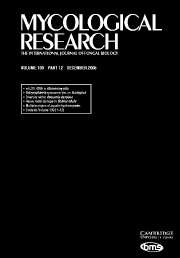Crossref Citations
This article has been cited by the following publications. This list is generated based on data provided by
Crossref.
Purvis, Andrew I.
Pipe, Nicholas D.
Day, Jenny P.
Shattock, Richard C.
Shaw, David S.
and
Assinder, Susan J.
2001.
AFLP and RFLP (RG57) fingerprints can give conflicting evidence about the relatedness of isolates of Phytophthora infestans.
Mycological Research,
Vol. 105,
Issue. 11,
p.
1321.
Strömberg, A.
Boström, U.
and
Hallenberg, N.
2001.
Oospore Germination and Formation by the Late Blight Pathogen Phytophthora infestans in vitro and under Field Conditions.
Journal of Phytopathology,
Vol. 149,
Issue. 11-12,
p.
659.
Fabritius, Anna‐Liisa
Cvitanich, Cristina
and
Judelson, Howard S.
2002.
Stage‐specific gene expression during sexual development in Phytophthora infestans.
Molecular Microbiology,
Vol. 45,
Issue. 4,
p.
1057.
Griffin, D.
O’Sullivan, E.
Harmey, M. A.
and
Dowley, L. J.
2002.
DNA fingerprinting, metalaxyl resistance and mating type determination of thePhytophthora infestans population in the Republic of Ireland.
Potato Research,
Vol. 45,
Issue. 1,
p.
25.
Dobrowolski, Mark P.
Tommerup, I.C.
Blakeman, Harley D.
and
O'Brien, Philip A.
2002.
Non-Mendelian Inheritance Revealed in a Genetic Analysis of Sexual Progeny of Phytophthora cinnamomi with Microsatellite Markers.
Fungal Genetics and Biology,
Vol. 35,
Issue. 3,
p.
197.
Oliva, R. F.
Erselius, L. J.
Adler, N. E.
and
Forbes, G. A.
2002.
Potential of sexual reproduction among host‐adapted populations of Phytophthora infestans sensu lato in Ecuador.
Plant Pathology,
Vol. 51,
Issue. 6,
p.
710.
Ghimire, S. R.
Hyde, K. D.
Hodgkiss, I. J.
Shaw, D. S.
and
Liew, E. C. Y.
2003.
Variations in the Phytophthora infestans Population in Nepal as Revealed by Nuclear and Mitochondrial DNA Polymorphisms.
Phytopathology®,
Vol. 93,
Issue. 2,
p.
236.
Day, J. P.
Wattier, R. A. M.
Shaw, D. S.
and
Shattock, R. C.
2004.
Phenotypic and genotypic diversity in Phytophthora infestans on potato in Great Britain, 1995–98.
Plant Pathology,
Vol. 53,
Issue. 3,
p.
303.
Cooke, D. E. L.
and
Lees, A. K.
2004.
Markers, old and new, for examining Phytophthora infestans diversity.
Plant Pathology,
Vol. 53,
Issue. 6,
p.
692.
Spring, Otmar
and
Zipper, Reinhard
2006.
Evidence for asexual genetic recombination in sunflower downy mildew, Plasmopara halstedii.
Mycological Research,
Vol. 110,
Issue. 6,
p.
657.
Rumbou, Artemis
and
Gessler, Cesare
2006.
Particular Structure of Plasmopara viticola Populations Evolved Under Greek Island Conditions.
Phytopathology®,
Vol. 96,
Issue. 5,
p.
501.
Schoustra, Sijmen E
Debets, Alfons J. M
Slakhorst, Marijke
Hoekstra, Rolf F
and
Guttman, David S
2007.
Mitotic Recombination Accelerates Adaptation in the Fungus Aspergillus nidulans.
PLoS Genetics,
Vol. 3,
Issue. 4,
p.
e68.
Elansky, S. N.
and
Milyutina, D. I.
2007.
Heteroplasmosis in Phytophthora infestans.
Russian Journal of Genetics,
Vol. 43,
Issue. 3,
p.
255.
Mazáková, Jana
Zouhar, Miloslav
and
Ryšánek, Pavel
2018.
Significance of Sexual Reproduction of Phytophthora infestans in the Czech Republic.
Acta Universitatis Agriculturae et Silviculturae Mendelianae Brunensis,
Vol. 66,
Issue. 5,
p.
1191.
Maurice, Sundy
Montes, Melanie S.
Nielsen, Bent J.
Bødker, Lars
Martin, Michael D.
Jønck, Carina G.
Kjøller, Rasmus
and
Rosendahl, Søren
2019.
Population genomics of an outbreak of the potato late blight pathogen, Phytophthora infestans, reveals both clonality and high genotypic diversity.
Molecular Plant Pathology,
Vol. 20,
Issue. 8,
p.
1134.
Wang, Wei
Wang, Bo
Sun, Xiaofang
Qi, Xiaobo
Zhao, Conghao
Chang, Xiaoli
Khaskheli, Muhammad Ibrahim
and
Gong, Guoshu
2021.
Symptoms and pathogens diversity of Corn Fusarium sheath rot in Sichuan Province, China.
Scientific Reports,
Vol. 11,
Issue. 1,


